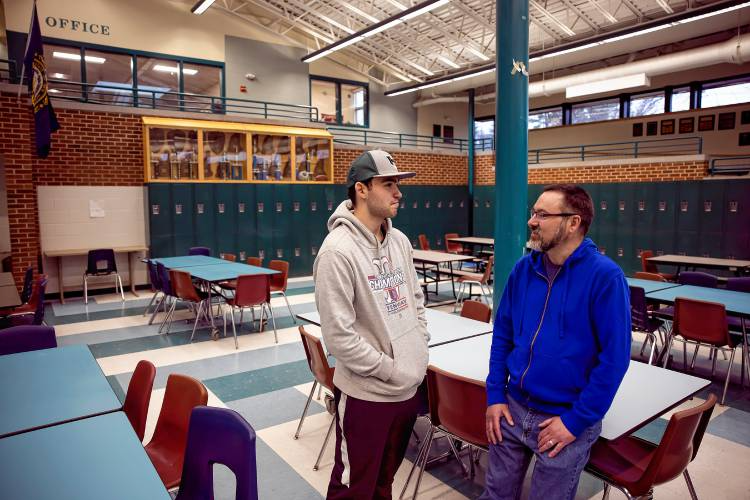Theatre Dept. adapts to COVID-19 restrictions
April 2, 2021
The University of New Hampshire (UNH) Theatre Department faced many challenges this year as they navigated ways to cope with COVID-19 restrictions amidst performing their 2020-2021 performance season.
“Because of COVID, we obviously are social distancing, and were staying away from people. We don’t have any blocking that puts people close to each other,” said junior musical theatre major, Emily Shaffritz. “The other major difference is that most of our productions are filmed now and most of them don’t have a live audience at all.”
Students must stay 6 feet away from each other at all times, wear masks and limit close contacts, according to the UNH THDA website, to comply with the’‘Center for Disease Control and Prevention (CDC) guidelines.
The department most recently put on a production of “I Love You, You’re Perfect, Now Change,” directed by assistant professor and director of the musical theater program, Tom Alsip.
“One of the reasons why we chose the show is because it would work well under the COVID restrictions,” says Alsip. “It’s a small cast. The other benefit is its very malleable.”
The actors started rehearsing in November over a course of three weeks to learn music and do character work. They then had a two-month break before jumping into in-person rehearsals at the beginning of the semester. The show was done in a staged reading style, with only four actors onstage at a time, each standing at a microphone to minimize movement and physical interaction.
“We used eight microphones even though only four people were at a time, so we could always stagger,” said Alsip. “Every microphone would have at least one full scene off to air out.”
According to a study led by scientists at the University of Bristol, singing does not generate more aerosols than speaking at the same level; however, actors are always projecting their voice even when they are just speaking.
“The costume designer gave us specially designed masks that would allow us to sing properly and have full jaw movement,” said junior musical theater minor, Megan Murphy who was in the cast of the show.
“Because of the masks being on your face, you can only really work with your eyes so that requires so much more acting in fact and so much more thought into everything that goes a part of performing,” said cast member and junior musical theater major, Hannah Wasacz.
Sophomore musical theatre major, Zeke Solis, who has taken part in multiple theatrical productions this year, said one of the hardest parts of performing through COVID is having to limit physical contact.
“I had a couple of intimacy scenes that I needed to do, but of course, it had to be socially distanced, so that was strange to kind of get used to,” said Solis.
Another hardship is lack of audience, said Alsip. “In the room after every scene, the song would end, and nobody would clap. And then they’d make a joke, and nobody would laugh,” said Alsip. “So, I think that’s what I’m missing most because there’s an energy the audience brings.”
Solis said he was a part of the school’s production of “A Midsummer Night’s Dream,” which was done in the style of a film.
“I think this was an interesting experience for all of us just in the fact that with film, you get to do another take if you don’t like it but in theatre its one shot and you’re done,” said Solis.
The school’s upcoming production of the Greek play “Hecuba,” directed by theater professor David Kaye, is set to be performed Saturday and Sunday, Apr. 24, 25 & May 1, 2, all at 2 p.m. with a live audience.
“This is going to be a real live theatre performance, because we’re performing it outside in the Rudman Amphitheatre where we can easily get lots of social distance,” said Kaye. “Even at 6 to 8 feet distance in that space I think we can get an audience of at least 100.”
Kaye explained that the performers will be wearing Greek and Roman style masks which will double as COVID-19 masks.
“We’re doing it in a traditional Greek and Roman style,” said Shaffritz, who has been cast as a percussionist in the production.
Kaye said, “we’ll be able to experience the play and the interaction with the audience that ultimately is what theatre is all about.”
Photo courtesy of UNH Theatre Department.





























